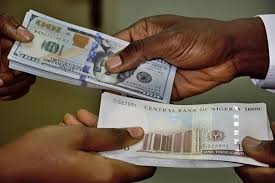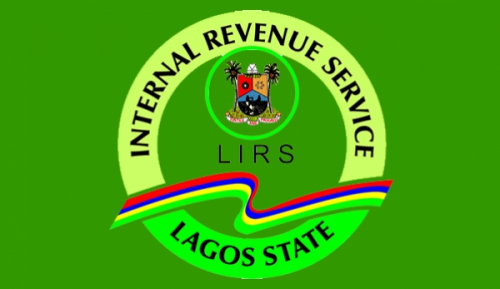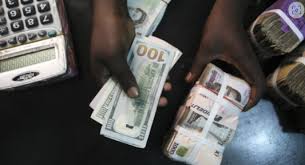CBN threatens to arrest, prosecute naira abusers

*Says COVID-19 pandemic affects depreciation in value of Naira- CBN
MOTOLANI OSENI
The Central Bank of Nigeria (CBN) has threatened to begin arrest and prosecution of abusers naira notes with collaboration of other regulatory bodies.
The apex bank noted that it is determined to achieve this with the support of the Nigeria Police Force, Federal Inland Revenue Service, the Economic and Financial Crimes Commission (EFCC) and the Nigerian Financial Intelligence Unit (NFIU).
The warning, according to the CBN, was necessitated by the activities of some people who flagrantly abuse the legal tender at social functions.
According to the apex bank, mishandling, defacing and hawking naira notes at social events are in violation of Section 21(3) of the Central Bank of Nigeria Act 2007 (As amended)
Ag. Director, Corporate Communications, CBN, Osita Nwanisobi, who made the disclosure in a statement on Monday, said: “The attention of the Central Bank of Nigeria has again been drawn to the activities of persons, who flagrantly abuse the legal tender by hurling wads of Naira notes in the air and stamping on the currency at social functions.
“There have also been cases where people mishandle the Naira, deface it, hawk the currency at parties and reject the currency in some instances. It should be stated that, contrary to the practice of these unpatriotic persons, it is neither cultural nor moral, for people to disrespect the currency which citizens trade in.
“For the avoidance of doubt, Section 21(3) of the Central Bank of Nigeria Act 2007 (As amended) stipulates that “spraying of, dancing or matching on the Naira or any note issued by the Bank during social occasions or otherwise howsoever shall constitute abuse and defacing of the Naira or such note and shall be punishable under the law by fines or imprisonment or both.”
“Accordingly, the Central Bank of Nigeria (CBN) is collaborating with the Nigeria Police, Federal Inland Revenue Service (FIRS), the Economic and Financial Crimes Commission (EFCC) and the Nigerian Financial Intelligence Unit (NFIU) to address the unpatriotic practice.
“We, therefore, warn Nigerians, particularly those at social functions such as birthdays, weddings and funerals, to desist from disrespecting the Naira or risk being arrested by law enforcement agencies. The Naira is our legal tender and symbol of national pride. Let us respect it and handle it with care.”
Meanwhile, the Deputy Governor, Corporate Services Department of the Central Bank of Nigeria, Mr. Edward Adamu, has attributed the depreciation in the value of the Naira to the effects of the COVID-19 pandemic on the economy.
Adamu stated this at an interactive session with the House Committee on Finance on the 2022-2024 Medium-Term Expenditure Framework/Fiscal Strategy Paper (MTEF/FSP) in Abuja.
He explained that the exchange rate was determined by the forces of demand and supply and that there were three main avenues by which Nigeria got its foreign exchange.
“We have proceeded from the sale of crude oil, we have foreign portfolio inflows and remittances; those are the three major ways that we get forex.
“Crude oil sale has not been as high as we all will want it to be and obviously in the aftermath of COVID-19, the global economy ground to a halt and the use of crude oil was also halted.
“To the extent that sometimes in April last year, we had crude oil selling at a negative value, which means that people were being paid to store what they bought and so that the avenue for forex inflows was significantly reduced.
“You go on to foreign portfolio inflows, you notice that investors also settled their affairs on the side of caution and so, once COVID-19 outbreak occurred, they moved out about $120 billion dollars from emerging markets to safe havens in America and Nigeria is one of those countries from where monies were withdrawn.
“On the side of remittances, once our brothers and sisters abroad were not working because of the situation they found themselves in; they had very little to send to us here and so, we also saw remittances reduced.
“On the demand side, we saw speculative demand on the side of Nigerians, if you needed a truck of goods because you are not sure of the uncertainties of COVID, you wanted to get three trucks.
“All these pressures on both the demand and supply side, the availability of dollars became more difficult and we had a decline or depreciation in the value of the naira,’’ he said.
Adamu, however, said that a lot of efforts within the CBN and the recovering global economy were helping oil prices and remittances to recover.
“This is why we are happy that the exchange rate has stabilised somewhat; it is a moving target, but it has stabilised in the import and export window for a while”, he added.
However, the Chairman of the committee, Rep. James Faleke (APC-Lagos), directed the CBN to present its audited account to the Office of the Accountant General of the Federation (OAGF) for scrutiny.
Faleke said that information available to the committee showed that the apex bank was yet to turn in its audited accounts since 2010 and about N800 billion was yet to be remitted to the Federal Government.
Adamu responded by saying the apex bank would interface with the OAGF and reconcile any difference there was and report to the committee in two weeks, through the Minister of Finance.










